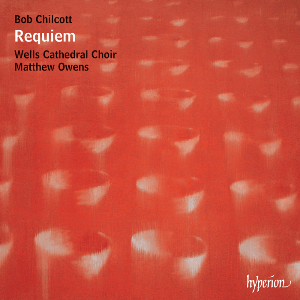Here’s a composer comfortable in his style and artistic self, and whose music embodies his absolute understanding of voices and song and ensemble singing. His singing credentials are obvious (he was a boy chorister and former member of the legendary King’s Singers—and he was the treble soloist in the “Pie Jesu” for a popular recording of the Fauré Requiem), and if you’re in the choral music world you are well aware of Bob Chilcott’s many excellent arrangements and original works for both adult and children’s choirs. He’s definitely not some pseudo mystic or pretentious musician who woke up one morning and decided, yes, I think I’ll write choral music. (Not suggesting any names here.) He’s truly a master of the genre, whether he’s writing liturgical music—the Downing Service; the Requiem—or church-worthy pieces—the Salisbury Motets—or anthems suitable for concerts or services.
Of course the Requiem is the “big number” here (all of these pieces are first recordings), and it’s deserving of that description. It’s not just about beautiful melodies and lovely harmonies and affecting solos–although all of these things are integral to the work; Chilcott has conceived and constructed a piece that owes more than a little something to its past—Fauré’s spirit is happily hovering—but more than that, he’s created a truly new work out of very old material from which has been built a formidable musical tradition. Chilcott said he wanted “to write a contemplative setting”, and indeed has succeeded, but that doesn’t mean somber—rather each movement builds to make an impression of something larger than itself, musically and emotionally—and ultimately we’re left uplifted. There’s a point to everything; text and music are well-thought-out, and the small instrumental ensemble is very artfully, judiciously used.
You also never get the sense that Chilcott was writing with the idea of, say, the Pie Jesu being the “hit” number, although it could be performed just fine out of context. But it’s not just a solo—a gorgeous soprano effort by Laurie Ashworth; Chilcott brings the chorus into play here as well as in the exquisite Agnus Dei, engagingly sung by tenor Andrew Staples. There’s much more to say, but I just recommend you get a copy of this for yourself and listen. And don’t forget the three “carols” that conclude the program—these, set to texts by Kevin Crossley-Holland, turned out to be for me the highlight: especially The Nine Gifts and, even better, Jesus, springing. You won’t forget this piece after the first time you hear it. A very successful effort all around, including first-class sound. Highly recommended!
































